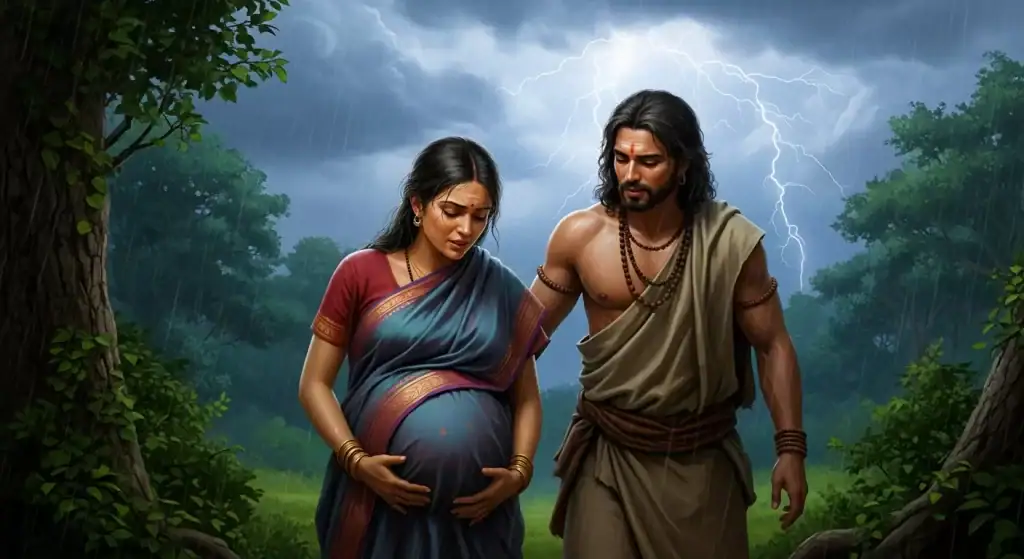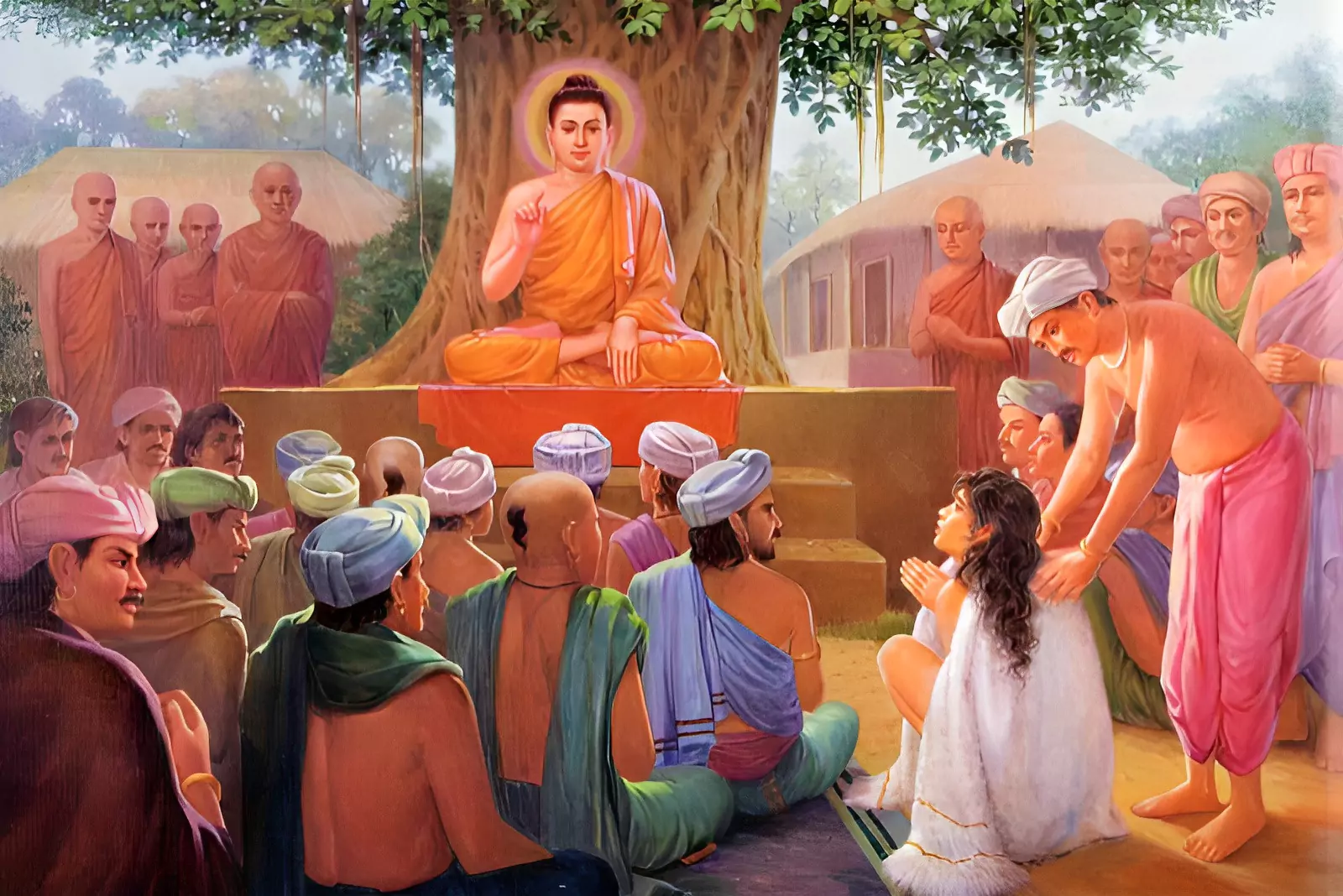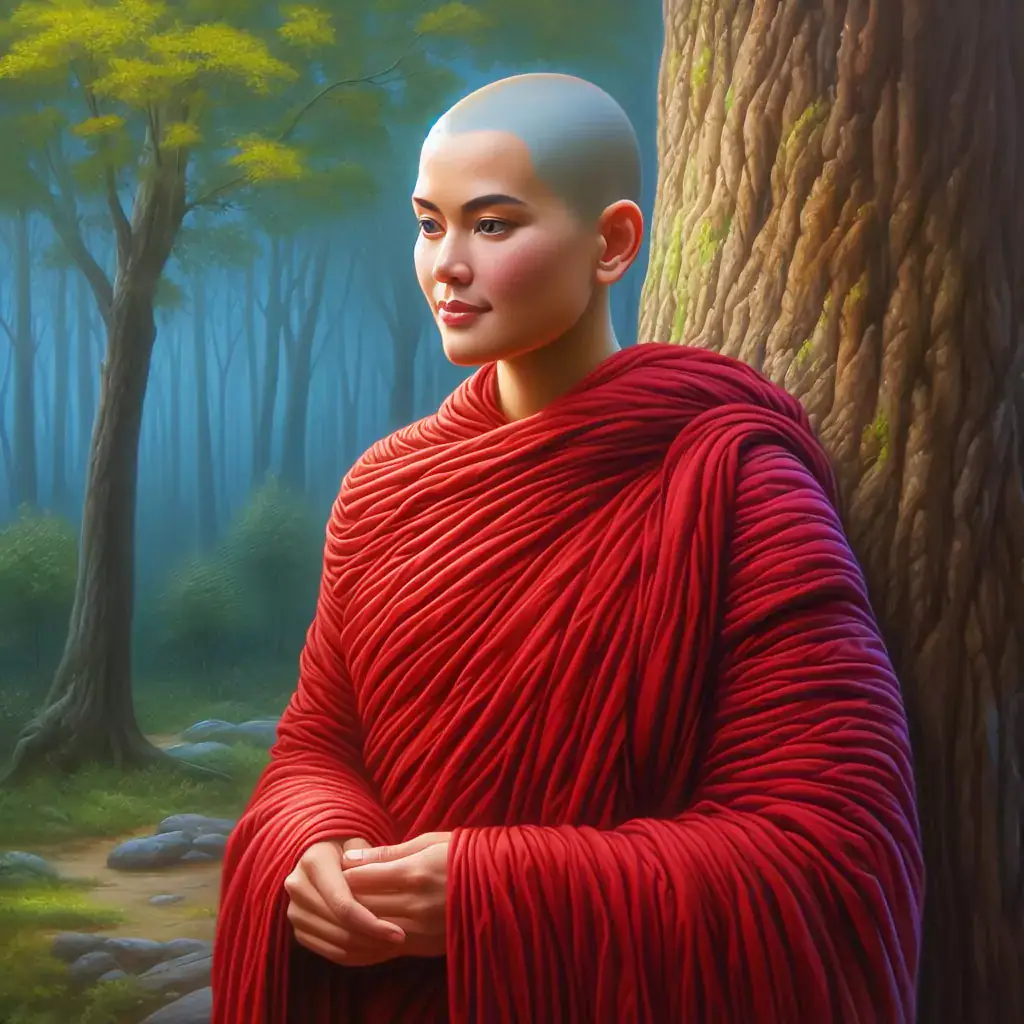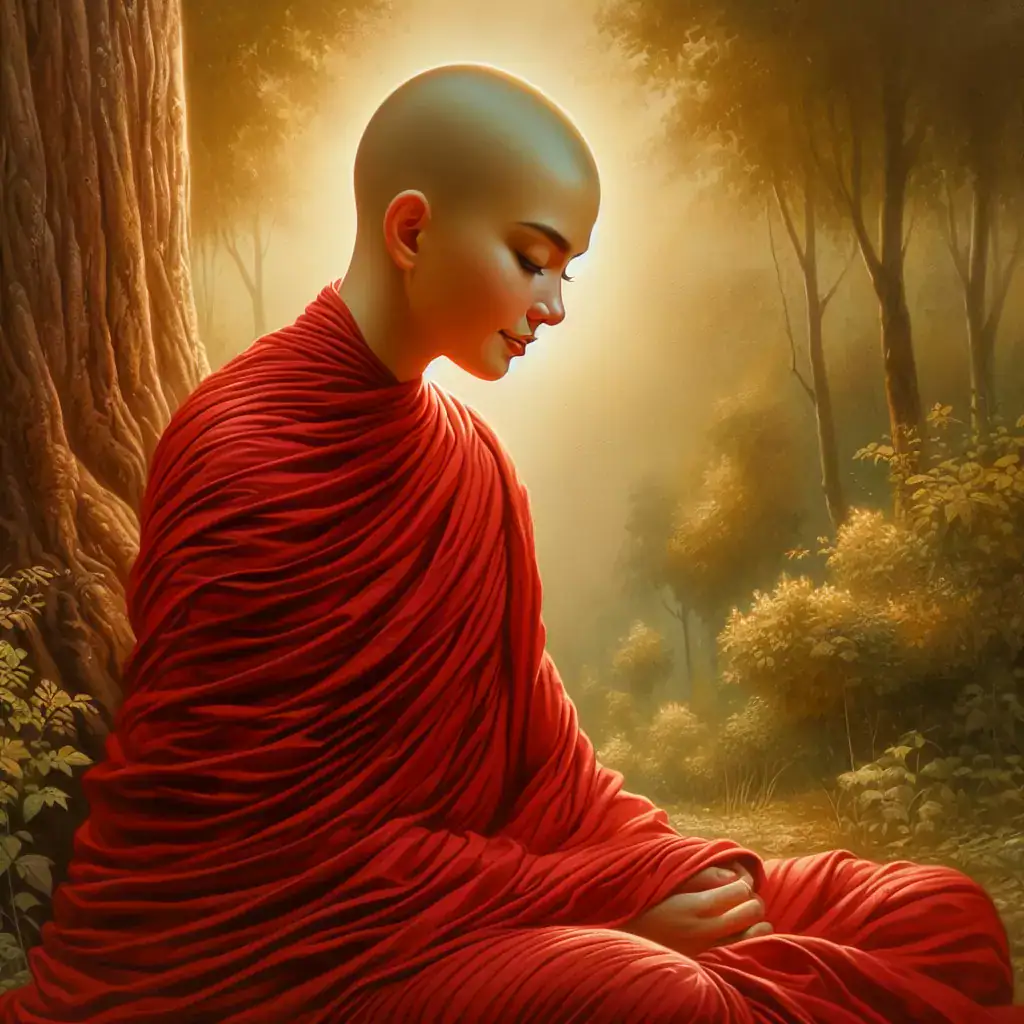Arahant Bhikkhuni Patacara
Patacara - Preserver of The Vinaya
Patācārā was the beautiful daughter of a very wealthy merchant of Sāvatthī. When she was sixteen years of age, her parents had her confined to the top floor of a seven-story high mansion, where she was surrounded by guards to prevent her from keeping company with young men. In spite of this precaution, she became involved in a love affair with a servant in her parents’ house.
When her parents arranged a marriage for her with a young man of equal social standing, she decided to elope with her lover. Having escaped from the tower by disguising herself as a servant girl, she met her lover in town, and the couple went to live in a village far from Sāvatthī. There the husband earned his living by farming a small plot of land, and the young wife had to do all the menial chores, which formerly had been performed by her parents’ servants. Thus she reaped the results of her deed.
When she became pregnant she begged her husband to take her back to her parents’ house to give birth there; for, she said, one’s mother and father always have a soft spot in their hearts for their child and can forgive any wrongdoing. Her husband refused, however, afraid that her parents would have him arrested or even killed. When she realized that he would not yield to her entreaties, she decided to go by herself. So one day, while her husband was away at work, she slipped out the door and set out down the road toward Sāvatthī. When her husband learned from the neighbours what had happened, he followed her and soon caught up with her. Though he tried to persuade her to return, she would not listen to him but insisted on continuing. Before they could reach Sāvatthī the birth-pains started and she soon gave birth to a baby son. As she had no more reason to go to her parents’ house, they turned back.
Sometime later Patācārā became pregnant a second time. Again she requested her husband to take her home to her parents, again he refused, and again she took matters into her own hands and started off, carrying her son. When her husband followed her and pleaded with her to return with him, she refused to listen. After they had travelled about halfway to Sāvatthī a fearful storm arose quite out of season, with thunder and lightning and incessant rain. Just then her birth-pains started.

-
Save
She asked her husband to find her some shelter. The husband went off to search for material to build a shed. As he was chopping down some saplings a poisonous snake, hidden in an anthill, came out and bit him. Its poison was like molten lava and instantly he fell down dead. Patācārā waited and waited for him, but in vain. Then she gave birth to a second son. Throughout the night both children, terrified by the buffeting of the storm, screamed at the top of their lungs, but the only protection their mother could offer them was her body, lean and haggard from her tribulations.
In the morning she placed the newborn baby on her hip, gave a finger to the older child, and set out upon the path her husband had taken, saying:
“Come, dear child, your father has left us.”
As she turned the bend in the road she found her husband lying dead, his body stiff as a board. She waited and lamented, blaming herself for his death, and continued on her journey.
After some time they came to the river Aciravatī. On account of the rain the river had swollen and was waist-high, with a violent current. Feeling too weak to wade across with both children, Patācārā left the older boy on the near bank and carried the baby across to the other side. Then she returned to take the firstborn across. When she was in midstream, a hawk in search of prey saw the newborn baby. Mistaking it for a piece of meat, the hawk came swooping down, pounced on the child, and flew off with the baby in its talons, while Patācārā could only look on helplessly and scream. The older boy saw his mother stop in midstream and heard her shouts. He thought she was calling him and started out after her, but as soon as he stepped into the river, he was swept off by the turbulent current.

-
Save
Wailing and lamenting, Patācārā went on her way, half-crazed by the triple tragedy that had befallen her: the loss of her husband and both her sons in a single day. But more misfortune lay ahead. As she approached Sāvatthī she met a traveller who was coming out from the city, and she asked him about her family.
“Ask me about any other family in town but that one,” he told her.
“Please don’t ask me about that family.”
She insisted, however, and thus he had to speak:
“Last night, during the terrible storm, their house collapsed, killing both the elderly couple and their son. All three were cremated together just a short while ago, There,” he said, pointing to a wisp of pale blue smoke swirling up in the distance, “if you look where I’m pointing you can see the smoke from their funeral pyre.”
When she saw the smoke, instantly Patācārā went mad. She tore off her clothing and ran about naked, weeping and wailing,
“Both my sons are dead, my husband on the road lies dead, my mother and father and brother burn on one funeral pyre!”
Those who saw her called her a crazy fool, threw rubbish at her, and pelted her with clods of earth, but she continued on until she reached the outskirts of Sāvatthī.

-
Save
At this time the Buddha was residing at the Jetavana monastery surrounded by a multitude of disciples. When he saw Patācārā at the entrance to the monastery he recognized her as one who was ripe for his message of deliverance. The lay disciples cried out,
“Don’t let that crazy woman come here!”
But the Master said, “Do not hinder her; let her come to me.”
When she had drawn near, he told her, “Sister, regain your mindfulness!”
Instantly, she regained her mindfulness. A kindly man threw her his outer cloak. She put it on, and approaching the Enlightened One, she prostrated herself at his feet and told him her tragic story.
The Teacher listened to her patiently, with deep compassion, and then replied,
“Patācārā , do not be troubled any more. You have come to one who is able to be your shelter and refuge. It is not only today that you have met with calamity and disaster, but throughout this beginningless round of existence, weeping over the loss of sons and others dear to you, you have shed more tears than the waters of the four oceans.”
As he went on speaking about the perils of saṃsāra, her grief subsided. The Buddha then concluded his instructions with the following verses:
The four oceans contain but a little water
Compared to all the tears that we have shed,
Smitten by sorrow, bewildered by pain.
Why, O woman, are you still heedless?
(Dhp Comy. 2:268; BL 2:255)
No sons are there for shelter,
Nor father, nor related folk;
For one seized by the Ender Kinsmen provide no shelter.
Having well understood this fact,
The wise man well restrained by virtues
Quickly indeed should clear
The path going to Nibbāna.
(Dhp 288–89)

-
Save
This exposition of the Enlightened One penetrated her mind so deeply that she could completely grasp the impermanence of all conditioned things and the universality of suffering. By the time the Buddha had finished his discourse, it was not a lamenting madwoman that sat at his feet but a stream-enterer, a knower of the Dhamma, one assured of final liberation.
Immediately after attaining stream-entry Patācārā requested the going forth and the higher ordination, and the Buddha sent her to the bhikkhunīs. After entering the Bhikkhunī Sangha, the order of nuns, Patācārā practiced the Dhamma with great diligence. Her efforts soon bore fruit and she attained her goal. She describes her development in her verses in the Therīgāthā.
Ploughing the field with their ploughs, Sowing seeds upon the ground, Maintaining their wives and children, Young men acquire wealth.
Then why, when I am pure in virtue, Practicing the Master’s Teaching, Have I not attained Nibbāna—
For I am not lazy, nor puffed up?
Having washed my feet,
I reflected upon the waters.
When I saw the foot water flow
From the high ground down the slope,
My mind became concentrated
Like an excellent thoroughbred steed.
Having taken a lamp,
I entered my cell.
I inspected the bed and sat down on the couch.
Then, having taken a needle,
I pulled down the wick.
The liberation of the mind
Was like the quenching of the lamp.
(Thī 112–16)
As Patācārā observed the water trickling down the slope, she noticed that some streams sank quickly into the ground, others flowed down a little farther, while others flowed all the way to the bottom of the slope. This, she recognized, was a perfect metaphor for the nature of sentient existence: some beings live for a very short time only, like her children; others live into their adult years, like her husband; still others live into old age, like her parents. But just as all the streams of water eventually had to disappear into the soil, so Death, the End-maker, lays his hand upon all living beings, and none can escape his grasp.
When this realization dawned upon Patācārā her mind immediately became composed. With steady concentration she contemplated conditioned phenomena as impermanent, suffering, and nonself. But still, in spite of her efforts, she could not make the breakthrough to final liberation. Fatigued, she decided to retire for the night. When she entered her dwelling and sat down on the bed, just as she extinguished the oil lamp all the momentum she had built up through her previous practice bore fruit. In a fraction of a second, simultaneously with the quenching of the lamp, supreme knowledge arose. She had reached her goal, Nibbāna, the permanent quenching of the fires of greed, hatred, and delusion.

-
Save
During her career as a Bhikkhunī, Patācārā achieved the distinction of being designated by the Buddha as the foremost among the bhikkhunīs who are experts in the Vinaya (etadaggaṃ bhikkhunīnaṃ vinayadharānaṃ). She was thus the female counterpart of the Elder Upāli, the chief Vinaya specialist among the bhikkhus. This appointment was the fruition of an ancient aspiration. We are told that in the Dispensation of the Buddha Padumuttara Patācārā had seen the Teacher assign to an elder nun the position of preeminence among nuns versed in the Vinaya, and it seemed to her as if he were taking that nun by the arm and admitting her to the Garden of Delight. So she formed her resolve and made this aspiration:
“Under a Buddha like you may I become preeminent among nuns versed in the Vinaya.”
The Lord Padumuttara, extending his mind into the future, perceived that her aspiration would be fulfiled and gave her the prediction.
It is perhaps natural that Patācārā should have been particularly concerned with discipline, since in her earlier years she had experienced so keenly the bitter fruit of reckless behaviour. In the order of nuns she had learned that intensive training in discipline is indispensable for achieving peace and serenity. Through her own experience, moreover, she had acquired a deep understanding of the ways of the human heart and was thus able to help other nuns in their training. Many of the nuns turned to her for guidance and found great consolation in her advice.
One example is Sister Candā, who expresses her gratitude to Patācārā in a verse of the Therīgāthā:
Because she had compassion for me,
Patācārā gave me the going forth;
Then she gave me an exhortation,
And enjoined me in the ultimate goal.
Having heard her word,
I followed her instruction;
The lady’s exhortation was not vain.
I am canker-free with the triple knowledge!
(Thī 125–26)

-
Save
Another bhikkhunī, Uttarā, reported how Patācārā spoke to a group of nuns about conduct and discipline:
Exert yourselves in the Buddha’s Teaching,
Which having done, one does not repent.
Having quickly washed your feet,
Sit down on one side.
Having aroused the mind,
Make it one-pointed and well concentrated.
Examine the formations
As alien and not as self.
(Thī 176–77)
Uttarā took Patācārā ’s words to heart and thereby attained the three true knowledges.
In the Therīgāthā there is a description of how Patācārā used to teach other nuns and of the benefits they derived from her counsel. These verses, according to the colophon, are spoken by an unspecified group of thirty elder nuns who declared arahantship in the presence of Patācārā :
“Having taken up the pestle,
Young men pound the grain.
Maintaining their wives and children,
Young men acquire wealth.
Practice the Buddha’s Teaching,
Which having done, one does not repent.
Having quickly washed your feet,
Sit down on one side.
Devoting yourself to serenity of mind,
Practice the Buddha’s Teaching.”
Having heard her advice,
Patācārā’s instruction,
They cleaned off their feet and sat down to one side.
Then, devoted to serenity of mind,
They practiced the Buddha’s Teaching.
In the first watch of the night
They recollected their former births.
In the night’s middle watch
They purified the divine eye.
In the last watch of the night
They sundered the mass of darkness.
Having risen, they worshiped her feet,
“Your instruction has been taken to heart.
As the thirty gods honour Indra,
The one unconquered in battle,
So shall we dwell honouring you.
We are cankerless, bearers of the triple knowledge.”
(Thī 119–21)
Patācārā was able to effect the change from a frivolous young girl to a Sangha elder so quickly because in previous births she had already developed the requisite faculties. Under previous Buddhas, it is said, she had been a nun many times. The insights she had thereby gained were hidden beneath her actions in subsequent lives, awaiting the right conditions to ripen. When her Master, the Buddha Gotama, appeared in in the world, she quickly found her way to him, spurred on by suffering and by the unconscious urge to find a way to release from the beginningless round of rebirths. Drawn to the Awakened One and his emancipating Dhamma, she entered the homeless life and attained to unconditioned Freedom.
(From the book: GREAT DISCIPLES OF THE BUDDHA – NYANAPONIKA THERA AND HELMUTH HECKER , Edited with an Introduction by BHIKKHU BODHI)
